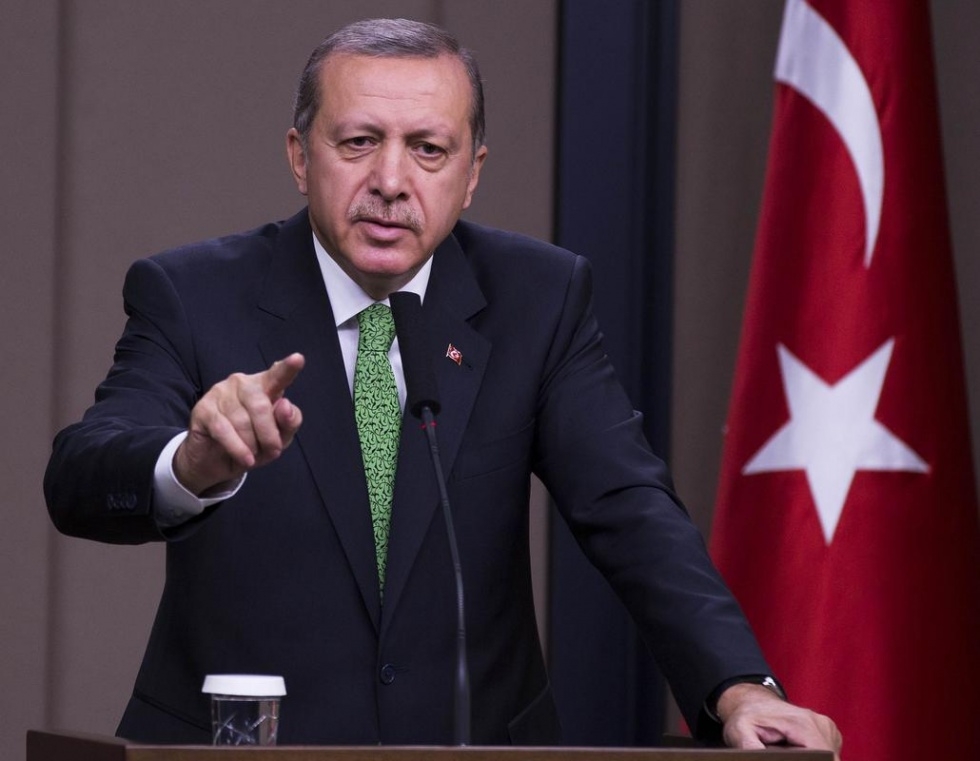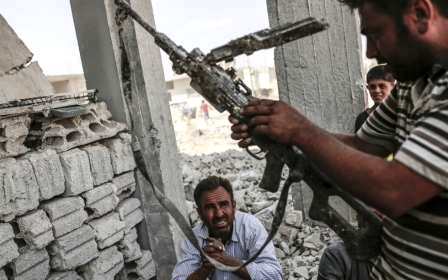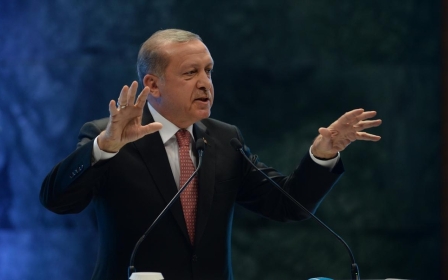ANALYSIS: Is ‘citizen policing’ in Turkey a recipe for disaster?

As sections of Turkish society - shopkeepers in particular - increasingly take it upon themselves to act as an unofficial law enforcement wing and dispensers of justice, concerns are growing that it will simply result in the further spread of mob culture and lawlessness. But proponents of such self-styled citizen policing insist it makes neighbourhoods safer.
The gathering and meddling by large crowds at the scene of any incident in Turkey is a common sight.
The extent to which such citizen policing polarises society became clear when thousands of Turkish social media users reacted with gleeful delight after video footage emerged last week of an Irish tourist of Kuwaiti origin, Mohammed Fadel Dobbous, single-handedly decimating a mob of shopkeepers that attacked him with wooden clubs and an assortment of improvised weapons.
Video footage showed Dobbous being set upon by an irate shopkeeper and a dozen of his fellow tradesmen in Istanbul’s central neighbourhood of Aksaray after he spilled some bottles of water in a shop.
Senol Palan, the shopkeeper in question, vehemently denies that the fight broke out because of spilled water bottles.
“I am not a lunatic to charge at someone with a club over a few spilled bottles of water,” Palan told Middle East Eye.
“My shop is in a touristic area and I serve hundreds of tourists every day. Why would I want to pick fights with them when I earn my living through them,” he said.
“This big guy had come to the shop 10 minutes before the fight and insisted on buying alcoholic beverages. Despite repeatedly telling him that I don’t stock such beverages, he insisted that he had purchased some here before. I finally got fed up and told him that even if I had any, I wouldn’t sell it to him.”
Palan says the media, for whatever reason, are not showing the entire footage of the incident and insists that the burly tourist in question had come to his shop with two others to pick a fight.
“I have provided the police with the entire security camera footage from my shop. I don’t know why the media repeatedly only show part of it,” said Palan.
Palan says he is not saddened that many of his compatriots are revelling in his misfortune.
“There is more to this thing about denigrating shopkeepers. It is not about me. It goes beyond me,” he said.
Palan also insists that he didn’t call on fellow tradesmen to help him fight the tourist.
“I work in this neighbourhood. When my colleagues saw my property being attacked, they naturally came to my assistance and tried to help.”
Palan is not willing to settle the issue even if the tourist were to apologise.
“If it was a misunderstanding or my fault, I would have gone and apologised. But he came here to start a fight and damage my livelihood. I cannot accept that.”
Dobbous told local media outlets that he had his arm broken, his shoulder blade cracked and was stabbed in the waist, just for a bottle of water.
“I went to apologise to the shopkeeper but I saw him advancing toward me and then I saw someone else launch an attack on me,” said Dobbous.
A police investigation has been launched into the incident.
Regular occurrence
While this particular altercation drew a lot of attention since it involved a tourist and due to the nature of his response to his attackers, it was by no means an isolated incident.
The recent past alone has involved high-profile instances of regular citizens meting out vigilante justice.
On 14 February 2015, Nuh Koklu, a journalist, was stabbed to death in Istanbul by shopkeeper Serkan Azizoglu after a stray snowball struck his shop window. Koklu and his friends were throwing snowballs at each other when the incident occurred.
Azizoglu is currently on trial facing a life sentence for murder.
According to a report published in the Turkish newspaper Hurriyet about one of the trial sessions, Azizoglu claimed it was not just a single snowball that struck his shop’s window, and that he repeatedly called on Koklu and his friends to stop, but they ignored him.
The newspaper report also cites the victim’s attorney as saying that the brother of the defendant had sent a letter to the presidency through an intermediary stating that the victim was an anti-Justice and Development Party (AKP) leader of the Gezi Park protests, thereby hoping to get some leniency during sentencing.
“Death comes to everyone but my brother shouldn’t have been killed by such a rabid hate-filled murderer,” said Sedat Koklu, the victim’s brother, at one trial session.
“I believe in our justice system and that the stiffest sentence will be handed out,” he said.
The date for the next trial session has been set for October.
Official encouragement?
Although there is no legal basis for vigilante “citizen policing,” with local community members taking on the role of judge, jury and executioner, critics say mob culture is encouraged by occasional remarks made by officials.
President Recep Tayyip Erdogan, in a speech in 2014, said that Turkish cultural traditions necessitated that when required, tradesmen and shopkeepers can act as police, soldiers and judges.
Tayfun Atay, a professor and head of the sociology department at Istanbul’s Okan University, is of the firm belief that such remarks by officials - the president in particular - has quite a huge impact on how people behave, and says it even indirectly has a bearing on how those shopkeepers in Aksaray reacted to a tourist whose actions apparently offended them.
“The president’s attitude and populist style of politics, especially his strategy of polarising society and then siding with the segment that reflects his own ideology has a large impact on the increase of such types of incidents,” Atay told MEE.
“This really came to the surface during the Gezi demonstrations. Encouraged by the president’s direct targeting of secular segments of society, the other segment - including shopkeepers whose political affiliations lie that way - started attacking these demonstrators who were just making use of their civil liberties to protest,” said Atay.
Supporters insist such remarks should be placed within context and are not a call for citizens to take the law into their own hands. They say Erdogan was simply trying to assure shopkeepers that they mean more than just trade to the country. Critics, however, are adamant that such remarks only serve to encourage unlawful behaviour, particularly among lesser-educated sections of society who take such remarks at face value.
Blaming Erdogan
According to Hilal Kaplan, a sociologist and writer at the conservative pro-government Turkish newspaper Sabah, there exists an unfortunate mindset in Turkey at the moment, where attempts are made to place the blame for everything at Erdogan’s door.
“Even an assault by shopkeepers on a tourist is blamed on Erdogan. What does this have to do with him? The shopkeepers of Istanbul’s Aksaray and Laleli neighbourhoods were notorious for this kind of behaviour long before Erdogan’s arrival on the scene,” Kaplan told MEE.
“Erdogan’s remarks about shopkeepers were blown out of proportion and taken out of context. We should remember that he made these remarks when shopkeepers were faced with growing instances of vandalism, looting and arson,” she said.
In many such situations the perpetrators resort to nationalist or religious-based rhetoric to justify their actions. Ironically, the latest such case was on 20 August when an off-duty air force pilot was attacked by shopkeepers in the city of Konya after they claimed he was a member of the Kurdistan Workers’ Party (PKK).
The pilot said his attackers asked him to show identification documents and was attacked after refusing to do so. Police arrested two people, who were released after giving their police statements.
Broader implications
Incidents involving mob violence and vigilante justice come into the spotlight due to the often drastic and tragic consequences that ensue, but they merely skim the surface when it comes to the issue of “neighbourhood pressure” as a whole.
A constant fear among sections of society has been the gradual erosion of the secular values upon which modern Turkey has been founded. Comments by top officials in the conservative government, which has been in power for more than a decade, exacerbate these fears.
Critics believe such comments also lead to members of conservative communities taking it as a signal to act as custodians of morality in their neighbourhoods and leads to people being targeted for their lifestyle choices.
Kaplan says such claims are simply acts of fear-mongering and a simple look at statistics shows that not only have lifestyles not been interfered with, but instead point to an increase in habits normally associated with secularist circles.
“In Turkey, the number of people cohabiting out of wedlock and alcohol consumption has risen in the last 10 years, not declined,” said Kaplan.
Targeting secular society
“How can we speak of imposing any set of values when even abortion procedures have come under the coverage of state-provided health insurance? When there are no objections raised about gay pride marches, with increasing participant numbers, being held during the Muslim holy month of Ramadan in Istanbul and other cities,” she said.
In 2013, Erdogan, prime minister at the time, said in a speech that the government would act upon information in cases of mixed-gender cohabitation by students in private housing. He said that as a government of conservative democrats, this was the responsibility placed on them as guardians of all children.
In another instance, Bulent Arinc, the former deputy prime minister, became the subject of scorn on social media last year when he said that it was not appropriate for women to laugh out loud in public.
Atay is of the opinion that the AKP, especially since 2011, has adopted a deliberate strategy of targeting the secular segment of society, which he says makes up 35 percent of society by conservative estimates, if not 50 percent.
“These are attempts to target secular lifestyles and values in the public sphere to gradually make them unacceptable in society,” says Atay.
“A parliamentarian of the AKP elected from Istanbul openly said in 2011 that the party’s aim was to change Turkey and make it more religious in character,” said Atay.
Two nations
Atay refers to prominent Turkish sociologist Serif Mardin’s concept of Turkey being comprised of two “nations,” the secular and the Islamic nations, and says the president has always embarked on a quest to bolster the Islamic segment against the secular segment, which might be a minority but is far from being an insignificant one. Mardin was the first sociologist to coin the term “neighbourhood pressure” in Turkey.
Kaplan insists on context and points to conservative Republicans in the United States and their pro-life stances and positions on same sex marriages.
“Erdogan was prime minister and the leader of a conservative party at the time of those remarks. What did people expect him to say? Those are the positions of conservatives everywhere. No one bats an eyelid when leaders in other countries adopt similar positions on such subjects but when it comes to Erdogan, everybody lines up to attack him,” she said.
For Atay, the main issue is that Turkish society needs to find harmony and strike a balance between the two ideologically opposed sections of society. He says it is unfortunate that the president of the country, who is required by the constitution to embrace all sections of society, and should take the lead on this issue, is not inclined to do so.
“We have a president who is not at all interested in this and would rather continue to polarise society.”
Kaplan does concede that Arinc’s remarks, on the other hand, were excessive and says even the AKP’s base rejects such extreme views. But she does believe that members of various communities, whether they be shopkeepers or involved in other things, can help enhance neighbourhood safety by being vigilant.
Stay informed with MEE's newsletters
Sign up to get the latest alerts, insights and analysis, starting with Turkey Unpacked
Middle East Eye delivers independent and unrivalled coverage and analysis of the Middle East, North Africa and beyond. To learn more about republishing this content and the associated fees, please fill out this form. More about MEE can be found here.




